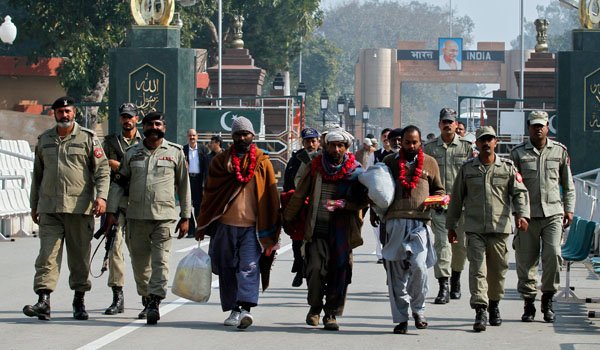With every passing day Punjab became tense. While tension was at its peak Lok Saba Speaker Hukum Singh, and the Punjab Chief Minister, Gurmukh Singh Musafir came to him and conveyed a message of acceptance of his demand by the Central government. The duo which met the Sant pretended to be special emissaries of Indira Gandhi. He reversed his decision of self immolation and broke the fast. After two months Sant Fateh Singh asked the Indian Government to fulfil the promises made to him through emissaries. He was bluntly conveyed that Sardar Hukum Singh and Gurmukh Singh Musafir had come to meet the Sant in their personal capacity and whatever they conveyed was not assurance of the Indian Government nor of its Prime Minister Indira Gandhi. Fifty Years have lapsed, Chandigarh even now remains a centrally administered territory. Though Sant Harchand Singh Longwal made similar attempts but apart from getting himself consumed in the process, he could not get any demand of Sikhs fulfilled by the Central Government.
Experience of Sheikh Abdullah was in no way different. Sheikh Abdullah endorsed accession of the J & K State to India through a letter written after instrument of accession was signed. He was assured that the relation between the Indian union and State of J & K will remain confined to the defence, foreign affairs and communications as envisaged in the Instrument of Accession. Once he insisted on confining the relation to only these subjects, he was consigned to fourteen years imprisonment. In 1975, he again made a mistake of getting engaged with New Delhi on the same promise that relations between Centre and the State of J & K will remain confined to the subjects mentioned in the Instrument of Accession. For this purpose, a provision was made within Indira-Abdullah Accord of 1975 that the demand of reverting back to pre-1953 position will be addressed within the ambit of Article 370 of the Constitution of India. Nothing was done apart from assigning the job of Chief Ministership to Sheikh Abdullah in pursuance of this agreement.
I have mentioned these incidents for the information of those who have been objecting to Syed Ali Shah Geelani’s refusal to meet some members of the All Party Delegation sent by New Delhi. In an interview to India Today Magazine, Ram Madhav the spokesperson of BJP has made it clear that there is no question of reverting back to 1948 position regarding J & K. His answer was in the backdrop of some suggestions made by Mr. Chidambaram and others. He bluntly mentioned that why those who are suggesting it to BJP Government didn’t do it while they themselves were in power.
Chidambaram and others. He bluntly mentioned that why those who are suggesting it to BJP Government didn’t do it while they themselves were in power.
Despite the existence of an elaborate constitutional and treaty mechanism on Kashmir dispute Indian government remains in denial mode. Whenever there are voices of acknowledgement it says dispute only pertains to Pakistan controlled areas. For resolution of Indian version of dispute too it needs to negotiate with Pakistan. When asked to negotiate, Indian rulers say it is our internal problem and does not need to be internationalised. So far as Indian engagements with resistance camp in Kashmir are concerned they too have remained nothing other than public relations exercise focussed on dilution of international pressure through a media hype. “Moderates” within Hurriyat had a meeting with L.K Advani while he was home minister of India. They had a similar meeting with Prime Minister Manmohan Singh. The meetings in no way were a serious exercise aimed at resolution of the dispute. None of the prerequisites for a dialogue existed within these engagements. The Indian state however used these occasions to create a dent in the credibility of moderates. Through this exercise however India tried to create an impression that they are serious about resolution of Kashmir dispute. The meetings were followed by nothing apart from off and on statements of Mirwaiz that Hurriyat is ready for dialogue. New Delhi remained indifferent and questioned the representative character of the Hurriyat. Cease fire and consequent meeting between Majid Dar faction of Hizbul Mujahideen too remained a similar exercise. Efforts of Yasin Malik didn’t yield any results apart from securing plum positions for two intellectual dalals used to lure him for negotiations. Some of those from the resistance camp who got engaged in this exercise faced the same fate as was destiny of Mr. Harchand Singh Longwal.
For years dormancy of resistance was projected as normalcy. Once Kashmir erupted after killing of Burhan Wani Indian state remained in a denial mode for weeks. Rulers of Delhi banked upon the advice of their collaborators that people will get exhausted. Contrary to their anticipation, once agitation didn’t die down they dispatched a parliamentary delegation to Kashmir. The delegation was a fire fighting exercise. It was destined to get a rebuff from the leadership which had staked its credibility for years in quest of a genuine dialogue. When calls for dialogue from pulpit of Jamia Masjid are ignored and insulted for years it can’t invoke anything apart from rebuff. Mirwaiz and Yaseen Malik did it in their own way for obvious reasons of being in captivity. Geelani resorted to it in his own style for which he is known ever since he has been rejecting anything short of right to self-determination.
(by Dr Sheikh Showkat Hussain - slguardian.org)






